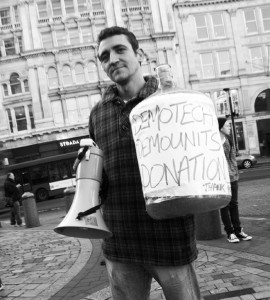 At Occupy we talk a lot about economic injustice, but less attention is paid to how our legal system legitimises and perpetuates the status quo. For example, consider the legal obligation of company directors to maximise profits for shareholders, above all other considerations. Such obligations, ingrained in the status quo of our society, can result in morally questionable outcomes.
At Occupy we talk a lot about economic injustice, but less attention is paid to how our legal system legitimises and perpetuates the status quo. For example, consider the legal obligation of company directors to maximise profits for shareholders, above all other considerations. Such obligations, ingrained in the status quo of our society, can result in morally questionable outcomes.
The structural injustice here is caused not just by skewed economics and big banks, it’s caused by our structures of governance as a whole; which is perhaps why the initial statement issued by Occupy London refers to the unqualified ‘system’ as being unjust – and not simply the unjust ‘economic system’.
Earlier this month, Envision Seattle and the Community Environmental Legal Defense Fund (CELDF) published a template Community Bill of Rights Ordinance for Occupy communities. The document is based on the great work by the CELDF (a US non profit) in producing community rights ordinances (i.e. local laws) which give power back to communities, strip corporates of their ‘personhood’ where they are in violation of the ordinance, and recognise the inalienable rights of natural communities and ecosystems to exist and flourish. These ordinances mean people can enforce the rights of natural communities and ecosystems on their behalf. (If it seems bizarre that an ecosystem such as an area of woodland might be recognised as a legal person, consider the fact that our society recognises the legal personhood of corporations – a mere legal fiction – which increasingly don’t even exist on paper!).
CELDF also work globally, and helped Ecuador to draft a new constitution, which, since 2008, has given legal recognition to the rights of nature. Since then, a global campaign has emerged in an effort to get the Universal Declaration of the Rights of Mother Earth adopted at the Earth Summit in Rio next year.
There is much of merit to be found in the Community Rights Ordinance for Occupy, and although it is drafted by US lawyers there is no reason why we in the UK could not adapt it and make it even more relevant to our society. The provisions regarding the right to self-governance, the right to clean government (e.g. free from corporate lobbying) and the removal of corporate personhood – where those corporates violate the rights guaranteed in the ordinance – are likely to receive a lot of support at Occupy.
By Melanie Strickland






